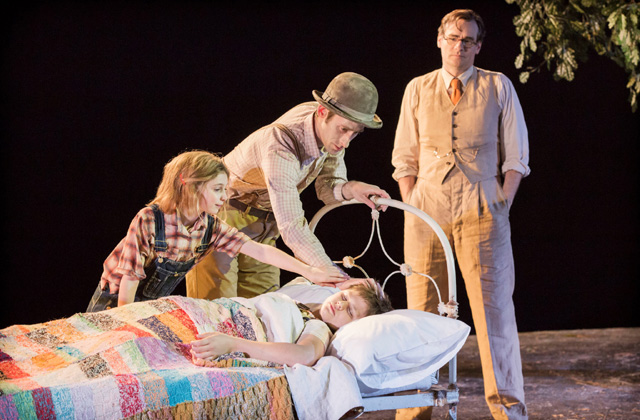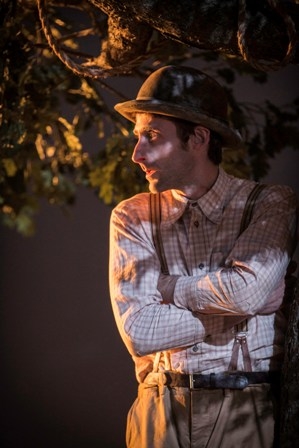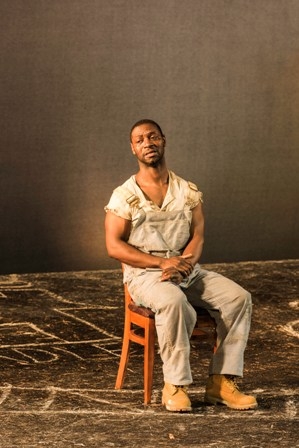The brilliant thing about Regent’s Park Open Air Theatre is how Creative Director Timothy Sheader always manages to filter the productions through the audience. Last year the kiss chases and fistycuffs off A Midsummer Night’s Dream swept past excited viewers as the actors ran through the stalls and fairies popped out of every entrance and hole in the ground. You might think To Kill a Mockingbird – a respectable classic – doesn’t lend itself to such shenanigans, but you’d be wrong. This production is a gem, making the absolute most of its venue and pouring imagination into the tale, to charming and thought-provoking effect.

Tightly wrapped up in as many layers as I had managed to stuff into my bag for work that morning, and cradling a steaming cup of tea, a sinking sense of dread came over me when a young Scottish girl in the audience stood up on her chair behind me and started reading from a battered copy of the book. I’m all for modern twists but I’d rather thought that the whole point of Harper Lee’s 1960 tale was that it is set in the Deep South, so I couldn’t really see how this was going to work with colloquial British accents. However this pessimism was premature and, as actors jumped up onto their seats all around the arena, the audience was left gaping-mouthed, turning their heads this way and that to see who was talking next. After making their way down to the stage, the actors then started to map out the Alabama town of Maycomb with chalk on the floor, which was not just practical but added to the feeling that this was storytime. Indeed, the use of the adult cast as narrators when not required in character is the best trick of Christopher Sergel’s adaptation; not only do you really feel like you’re being told a story but it circumvents the dilemma of trying to rely on a seven-year-old actress to convey all of Scout’s (the book’s narrator) thoughts and emotions. The dialogue itself was, thankfully, done in an appropriately Alabama lilt.
 The infamous Scout, along with her brother Jem and friend Dill, battle with their naivety and youthful idealism to realise, ultimately, the racial prejudices of their community and the more sinister inclinations of human nature. Their father, Atticus Finch, is the heroic lawyer who defends the innocent Tom Robinson – a young black man accused of raping a white woman – to the consternation of his peers, many of whom turn on the family for taking the wrong side in the race-war being fought in America at the time.
The infamous Scout, along with her brother Jem and friend Dill, battle with their naivety and youthful idealism to realise, ultimately, the racial prejudices of their community and the more sinister inclinations of human nature. Their father, Atticus Finch, is the heroic lawyer who defends the innocent Tom Robinson – a young black man accused of raping a white woman – to the consternation of his peers, many of whom turn on the family for taking the wrong side in the race-war being fought in America at the time.
Eleanor Worthington-Cox is mind-blowingly good as the feisty Scout. She is spirited and energetic, inquisitive and stubborn, and does a remarkable Southern accent (better than some of the adults). She and Callum Henderson as Jem propel the play along with wit, feeling and pace, and their journey is experienced by all, audience and narrators alike – the latter often sitting next to the children, watching their reactions whilst reading their thoughts out loud – and the whole theatre seems to learn their lessons. Their characters’ passion sometimes teeters into precocity but, as children, this is forgivable (and really rather funny). The ridiculousness of their society’s standards is thus highlighted, not by trivialising it but by seeing it through the eyes of a child, precisely as Lee intended.
Atticus is a calm, controlled and controlling presence in the form of Robert Sean Leonard. It’s a real treat to behold: a strong, brooding yet straightforward performance from a true pro. The fervour and fair nature of Lee’s protagonist is beautifully portrayed, Leonard exuding a sense of world-weariness that is overcome by only two things: his sense of justice and his lively children. In the courtroom scene which fills most of the second half, the audience is placed where the jury would be and Atticus’s final address in the trial is therefore directed at you. It makes you shrivel in your seat with a feeling of guilt, as the failings and cruelty, inadvertent or not, of society in general are thrown back at you – you (as the jury) are the ones who will be judging poor Tom Robinson but it is you, for that, who are being judged. And this doesn’t come across condescendingly but as a wake up call from a frustrated man. Leonard excels. You will want to cry.
 Boo Radley isn’t made into a pantomime baddy, instead his character is built up in the horror stories the children share with one another, making his appearance frightening just because of what you know. Simon Gregor makes a hilarious turn as the drunken, aggressive Bob Ewell, with a walk, a talk and a set of the mouth that make him grotesque yet tragically comic. There were strong performances from every one of the cast, with humour and poignancy carefully crafted into each moment.
Boo Radley isn’t made into a pantomime baddy, instead his character is built up in the horror stories the children share with one another, making his appearance frightening just because of what you know. Simon Gregor makes a hilarious turn as the drunken, aggressive Bob Ewell, with a walk, a talk and a set of the mouth that make him grotesque yet tragically comic. There were strong performances from every one of the cast, with humour and poignancy carefully crafted into each moment.
Music comes from Phil King, who wonders around with a guitar hanging from his neck. At times the Jack Johnston-ness of it seems a bit odd but it actually falls into the background very easily. The harmonica that he often whips out takes you straight to Alabama and the tension that he manages to create is rather impressive.
The themes here aren’t just touching in hindsight to 1930s America, they are relevant and disturbing in their presence in today’s culture. And that demonstrates the success of this production: it makes you think about that which Lee intended. Phenomenally acted, innovatively produced and utterly endearing, this is certainly worth freezing your toes off for.
To Kill A Mockingbird runs at the Regent’s Park Open Air Theatre until 15th June 2013. For more information and tickets visit the website.



